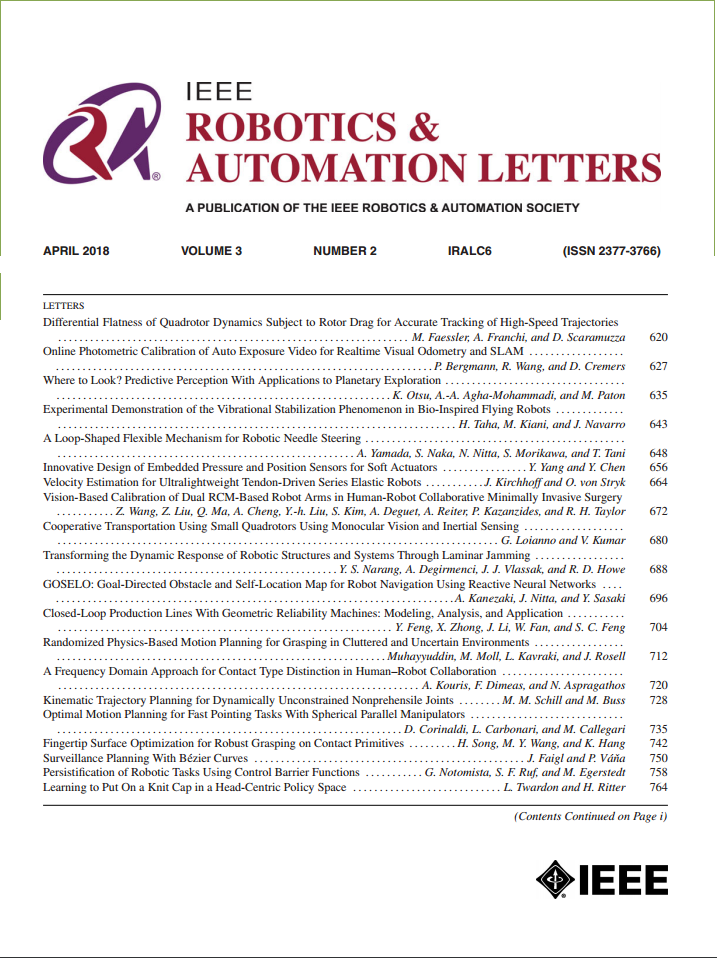Swim4Real: Deep Reinforcement Learning-Based Energy-Efficient and Agile 6-DOF Control for Underwater Vehicles
IF 4.6
2区 计算机科学
Q2 ROBOTICS
引用次数: 0
Abstract
Uncrewed underwater vehicles (UUVs) require precise and energy-efficient six-degrees-of-freedom (6-DOF) control to operate in complex underwater environments for long periods of time. Traditional controllers, like Proportional-Integral-Derivative (PID), struggle with nonlinear dynamics, while Model Predictive Control depends on accurate models, which are often complex or unavailable. Deep Reinforcement Learning (DRL), on the other hand, enables controllers to learn control strategies through environmental interactions, using neural networks capable of capturing nonlinear relationships. In this work, we introduce an end-to-end DRL-based controller, the Robust and Energy Efficient Framework (REEF) DRL, designed for precise 6-DOF control of UUVs while minimizing energy consumption. Furthermore, to improve robustness and adaptability, we propose REEF-DR DRL, which incorporates domain randomization. Through a comprehensive simulation-based evaluation, we demonstrate that our approach outperforms state-of-the-art DRL-based 6-DOF controllers for UUVs in terms of accuracy and energy efficiency. Furthermore, REEF DRL and REEF-DR DRL achieve position and orientation accuracy comparable to a well-tuned PID controller while reducing energy consumption by at least 30%. In-water experiments show that our controllers maintain high performance comparable to the well-tuned PID but reduce energy consumption by at least 39%. This work represents a significant advancement in applying DRL to underwater robotics, offering a promising solution to extend UUV operational autonomy.Swim4Real:基于深度强化学习的水下航行器节能敏捷六自由度控制
无人水下航行器(uuv)需要精确和节能的六自由度(6-DOF)控制,以便在复杂的水下环境中长时间运行。传统的控制器,如比例-积分-导数(PID),与非线性动力学作斗争,而模型预测控制依赖于精确的模型,往往是复杂的或不可用的。另一方面,深度强化学习(DRL)使控制器能够通过环境交互学习控制策略,使用能够捕获非线性关系的神经网络。在这项工作中,我们介绍了一个端到端的基于DRL的控制器,稳健和节能框架(REEF) DRL,旨在精确控制uuv的6自由度,同时最大限度地减少能耗。此外,为了提高鲁棒性和适应性,我们提出了结合域随机化的REEF-DR DRL。通过基于仿真的综合评估,我们证明了我们的方法在精度和能效方面优于最先进的基于drl的uuv 6-DOF控制器。此外,REEF DRL和REEF- dr DRL的位置和方向精度可与调谐良好的PID控制器相媲美,同时降低了至少30%的能耗。水中实验表明,我们的控制器保持了与调优PID相当的高性能,但至少降低了39%的能耗。这项工作代表了将DRL应用于水下机器人的重大进步,为扩展UUV操作自主性提供了一个有前途的解决方案。
本文章由计算机程序翻译,如有差异,请以英文原文为准。
求助全文
约1分钟内获得全文
求助全文
来源期刊

IEEE Robotics and Automation Letters
Computer Science-Computer Science Applications
CiteScore
9.60
自引率
15.40%
发文量
1428
期刊介绍:
The scope of this journal is to publish peer-reviewed articles that provide a timely and concise account of innovative research ideas and application results, reporting significant theoretical findings and application case studies in areas of robotics and automation.
 求助内容:
求助内容: 应助结果提醒方式:
应助结果提醒方式:


